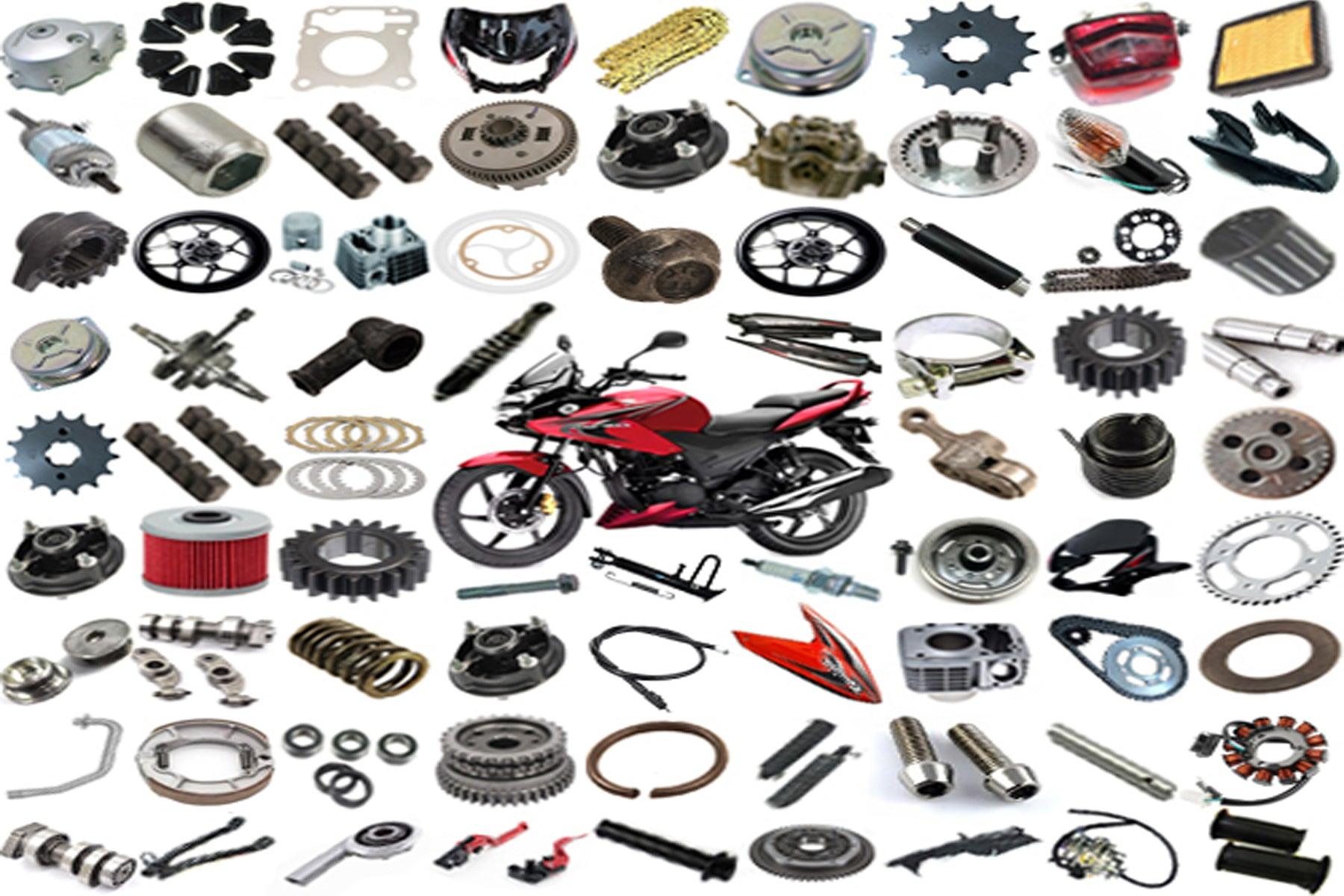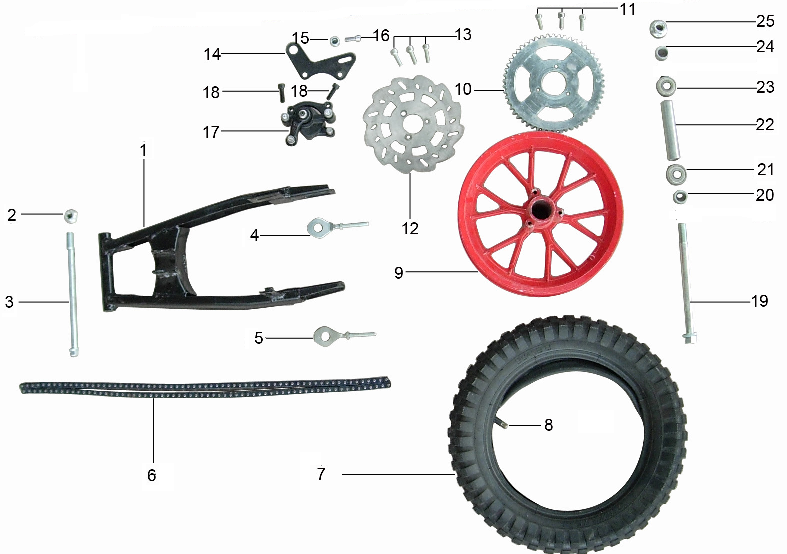The Smart Way to Match Your Bike’s Needs with the Right Motorbike Components NZ
The Smart Way to Match Your Bike’s Needs with the Right Motorbike Components NZ
Blog Article
Discover the Vital MotorBike Components You Required for Optimum Performance
Comprehending the vital parts of a bike is fundamental for accomplishing peak efficiency. Each component, from the engine to the stopping system, plays an important duty in overall capability and safety and security. Regular maintenance can stop unexpected failures and improve the riding experience. Numerous cyclists neglect the details of these systems. Discovering exactly how they function together can result in a more reliable experience. What critical parts should every rider prioritize?
The Engine: The Heart of Your Motorcycle
The engine functions as the core element of a motorbike, driving its performance and defining its capabilities. It is in charge of converting fuel into power, which powers the bike forward. Numerous kinds of engines are used, consisting of single-cylinder, V-twin, and inline setups, each offering distinctive attributes matched for various riding purposes and designs. The engine dimension, normally determined in cubic centimeters (cc), substantially affects performance, with larger engines usually giving even more power and torque.Furthermore, the engine's style and technology, such as gas shot systems or air-cooling versus liquid-cooling, impact efficiency and reliability. Upkeep is necessary for peak operation; elements like regular oil changes and monitoring trigger plugs warranty durability. Cyclists frequently consider an engine's responsiveness and level of smoothness, as these features improve the general riding experience. Eventually, the engine continues to be a vital element that specifies not only the bike's performance yet additionally the rider's connection to the equipment.
The Transmission: Changing Gears Efficiently
The transmission plays a vital role in a motorbike's performance, particularly in the mechanics of gear moving. Recognizing exactly how to change gears efficiently can improve the general riding experience, while routine upkeep guarantees peak performance. Appropriate focus to these facets can greatly impact the durability and effectiveness of the bike.

Gear Shifting Mechanics
Smooth gear changing is crucial for perfect motorcycle efficiency, considerably affecting both acceleration and control. The technicians of gear shifting involve the communication between the clutch, equipment lever, and transmission system. When a cyclist engages the clutch, it disengages the engine from the transmission, enabling for an equipment adjustment without harming the components. A well-timed launch of the clutch, integrated with accurate motion of the gear lever, assists in a smooth change in between gears. This procedure assures that the engine operates within its ideal power band, boosting performance. Bike Parts Wellington. Furthermore, recognizing the equipment ratios and their impact on rate and torque can assist motorcyclists make informed selections throughout shifts, inevitably adding to an extra pleasurable and receptive riding experience
Maintenance Tips Importance
Regular maintenance plays an important duty in ensuring that the transmission system runs efficiently, enabling for smooth gear shifts. Consistently checking and altering the transmission fluid is important, as old liquid can bring about boosted friction and wear. Additionally, inspecting the clutch for wear assurances peak engagement and disengagement, protecting against slippage during equipment changes. Lubrication of moving components is equally vital to reduce rubbing and improve performance. Bike proprietors must likewise keep track of for leaks and unusual sounds, as these can indicate underlying concerns. By sticking to these maintenance tips, riders can prolong the life expectancy of their transmission system, assuring that gear changes continue to be seamless and contributing to the general performance of their motorcycle.
The Braking System: Ensuring Safety on Every Trip
Braking systems are essential parts that straight affect a motorcycle's safety and security and efficiency. They are composed of numerous components, consisting of brake pads, blades, calipers, and hydraulic lines, all working together to ensure reliable deceleration. The sort of braking system-- generally either disc or drum-- influences responsiveness and quiting power.Regular upkeep is vital to promote peak performance; worn brake pads can bring about lowered efficiency and raised stopping ranges. In addition, the quality of brake fluid ought to be checked, as it can take in wetness in time, endangering braking efficiency.Riders should also consider the importance of anti-lock stopping systems (ABDOMINAL), which avoid wheel lockup during abrupt quits, enhancing overall security. Effectively working brakes are not simply regarding stopping; they impart confidence in the biker, enabling much safer navigation via numerous terrains. Eventually, a trusted stopping system is important for enjoying every ride with satisfaction.
The Suspension: Enhancing Comfort and Control
A well-functioning suspension system greatly adds to a motorcycle's general performance, complementing the effectiveness of the stopping system. The suspension plays a substantial function in taking in shocks from uneven surface areas, assuring a smoother experience while maintaining tire call with the road. This contact is essential for both security and control, enabling motorcyclists to navigate edges with self-confidence and precision.Different kinds of suspension systems, such as telescopic forks or mono-shocks, offer differing levels of comfort and handling. Effectively tuned suspension improves responsiveness, providing the cyclist with a much more connected feel to the motorcycle. Routine maintenance checks are vital to ascertain the suspension parts, consisting of dampers and springs, are operating at their he has a good point finest. An efficient suspension system not only elevates the riding experience yet additionally adds to the longevity of various other motorcycle parts by decreasing deterioration. Consequently, buying quality suspension is essential for any serious motorbike fanatic.
The Tires: Connecting You to the Road
Tires play an important function in a motorcycle's efficiency, serving as the key web link in between the cyclist and the roadway. Comprehending the various kinds of tires offered can significantly affect handling and security. Furthermore, regular maintenance is crucial to assure peak tire efficiency and durability.
Tire Keys In Explained
How do different tire kinds affect a motorbike's efficiency? Tire types play a vital role in determining a motorcycle's hold, handling, and stability. Sporting activity tires, designed for high efficiency, deal improved traction and responsiveness on smooth roadways, making them perfect for racing and hostile riding. On the other hand, exploring tires prioritize toughness and convenience, providing a smoother trip for long-distance travel. Off-road tires, defined by their tough walk patterns, master grip on unpaved surface areas, ideal for journey fanatics. In addition, dual-sport tires blend characteristics from both off-road and on-road classifications, accommodating functional riding needs. Ultimately, selecting the right tire type is vital for enhancing efficiency, guaranteeing safety, and boosting the total riding experience.
Upkeep Tips Offered
While riding on the roadway, keeping excellent tire condition is important for safety and efficiency. Consistently examining tire stress is essential, as under-inflated tires can lead to bad handling and boosted wear. It is recommended to inspect step deepness frequently; worn tires concession hold and stability. Additionally, riders must search for signs of damage, such as bulges or fractures, which can indicate the demand for replacement. Revolving tires regularly guarantees also use, enhancing long life. Furthermore, maintaining tires clean from debris and preventing too much aesthetics can prolong their life expectancy. Preserving correct alignment and balance contributes to come to a head efficiency, minimizing tension on various other bike components. Adhering to these upkeep suggestions will considerably enhance the overall riding experience.
The Gas System: Sustaining Efficiency and Effectiveness
The fuel system plays a vital role in taking full advantage of a motorcycle's efficiency and performance, as it assures the optimal shipment of fuel to the engine. It makes up several crucial elements, including the fuel storage tank, fuel pump, fuel filter, and fuel injectors or carburetor. Each part must operate successfully to guarantee a effective and smooth ride.The gas container shops gas and provides it to the engine using the gas pump, which creates the essential stress. A gas filter protects against impurities from getting in the engine, while the injectors or carburetor mix gas with air for combustion.Proper upkeep of the gas system is crucial; a blocked filter or malfunctioning injector can result in reduced efficiency and enhanced fuel consumption. By verifying that the fuel system operates effectively, motorcyclists can appreciate better throttle action, much better fuel economic climate, and in general enhanced riding experience.
The Electric System: Powering Your Adventure
An effective electrical system is vital for the general performance and safety of a motorbike, as it powers important elements such as the ignition, illumination, and various digital systems. This system includes the battery, which stores power, and the alternator, in charge of producing power while the engine runs. The circuitry harness links these parts, ensuring reliable power distribution.Additionally, integrates secure the system from overloads, while relays aid control high-current tools with low-power signals. A well-maintained electrical system boosts performance by making sure smooth begins and constant operation of signals and lights, important for rider exposure websites and safety.Regular checks of the battery's cost and links are essential for stopping electrical failures. Cyclists need to likewise evaluate wiring for deterioration, making sure all elements function ideally. Inevitably, a robust electric system adds substantially to the general efficiency and dependability of the motorcycle.
Frequently Asked Inquiries
Just how Often Should I Change My Motorcycle's Battery?
The frequency of motorbike battery substitute depends on usage and upkeep (Motorbike Components NZ). Typically, batteries need to be changed every three to five years. Normal checks can help determine when a replacement is needed for peak efficiency
What Tools Do I Need for Standard Motorbike Maintenance?
For fundamental motorcycle maintenance, one needs crucial tools such as an outlet collection, wrenches, screwdrivers, pliers, tire stress scale, and a torque wrench. These tools promote effective maintenance and assure the motorbike runs effectively and securely.
Exactly How Can I Improve My Motorbike's The rules of aerodynamics?
To improve motorbike the rules of aerodynamics, one must see here now think about adjusting fairings, utilizing windscreen extensions, maximizing body position, and minimizing total weight. These adjustments assist decrease drag, improving stability and fuel effectiveness throughout rides.
What Are the Indications of a Failing Electric System?
Signs of a stopping working electrical system consist of dimming lights, trouble beginning, irregular tool analyses, and blown fuses. Motorcycle Parts Auckland. Uncommon smells or rust around battery terminals may also suggest underlying issues needing prompt interest for safety and performance

How Do I Choose the Right Oil for My Motorcycle?
When picking oil for a motorbike, one should consider the supplier's specifications, viscosity ratings, and the sort of riding. In addition, synthetic versus standard oil can influence performance and engine security, influencing the decision significantly. The engine size, generally gauged in cubic centimeters (cc), substantially influences performance, with bigger engines normally offering even more power and torque.Furthermore, the engine's style and technology, such as gas shot systems or air-cooling versus liquid-cooling, affect effectiveness and reliability. A well-functioning suspension system considerably contributes to a motorcycle's total efficiency, matching the effectiveness of the stopping system. The fuel system plays a crucial function in maximizing a motorcycle's performance and efficiency, as it ensures the ideal delivery of gas to the engine. A fuel filter stops contaminants from going into the engine, while the injectors or carburetor mix fuel with air for combustion.Proper upkeep of the gas system is vital; a clogged filter or malfunctioning injector can lead to lowered performance and increased fuel consumption. A properly maintained electric system boosts performance by guaranteeing smooth starts and consistent operation of signals and lights, crucial for rider exposure and safety.Regular checks of the battery's fee and connections are important for preventing electric failures.
Report this page